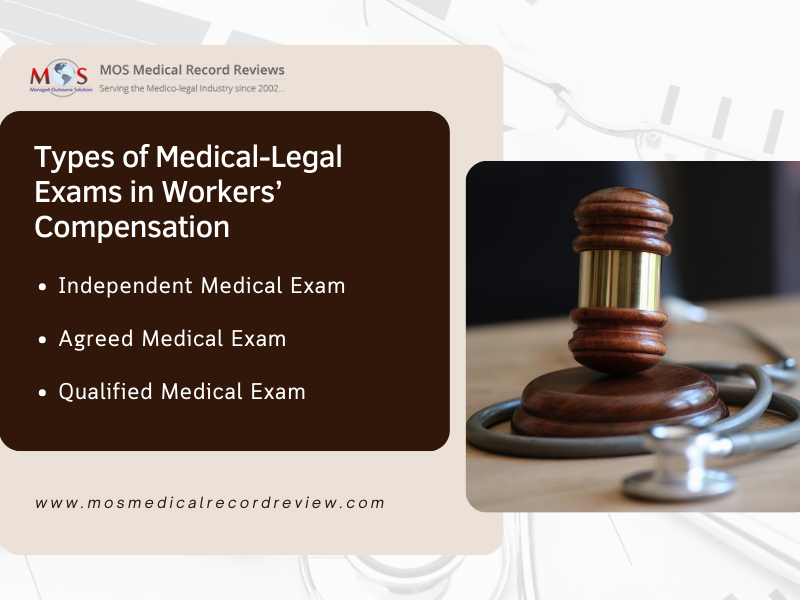In the realm of Workers’ Compensation, the roles of Independent Medical Examiners (IME), Qualified Medical Examiners (QME), and Agreed Medical Examiners (AME) are crucial in assessing and determining the medical aspects of a claim. Medical-legal exams are performed to identify the cause of the work-related injury, its extent and the medical treatment provided. Here, the important concern is liability. Attorneys utilize medical record review services to review the relevant medical records and determine the nature and extent of the injury and its possible impact. Accurate review of medical records form the cornerstone of evidence-based medical legal exams, providing a comprehensive and factual basis for informed decision-making, treatment planning, and resolution of disputes in the complex landscape of workers’ compensation claims.
Most US states do not have QMEs and AMEs. California is one state where all the three types of medical-legal assessments exist.
IMEs, AMEs and QMEs
Let us consider the differences between these types of exams while also discussing the significance of having the right medical records.
Independent Medical Examiner (IME)
An independent medical evaluation carried out by an independent medical examiner is an objective evaluation of the injured person’s medical condition. This assessment helps determine what treatment the person needs, whether he/she has a permanent impairment and the extent of impairment, and his/her ability to work in the future. As part of this exam, the doctor has to perform medical records review, examine the injured person, and write a medical report.
- Insurance companies typically request this exam when they disagree with the decision made by the treating doctor regarding the injured party’s course of treatment, or the degree/extent of any permanent disability. In such cases, the insurer may also select the doctor who performs the evaluation.
- Sometimes, the hearing officer or judge may ask for an IME when the case is disputed.
- The injured person may be able to request an IME when he/she disagrees with their treating doctor’s opinions. This depends on the rules of the particular state.
- IME doctors are considered experts and therefore considerable importance is attached to their medical opinion.
The outcome of an IME could have a significant impact on the workers’ compensation claim filed by the injured worker.
QME or Qualified Medical Examiner
A QME is a physician who is certified to provide an unbiased and truthful opinion about work-associated injury claims. This physician needs to be objective and review the medical claims without any partiality whatsoever. The qualified medical examiner must meet specific educational and licensing requirements. Besides this, they must also pass a test, and participate in ongoing education regarding the workers’ comp system.
The request for a QME can be made by either side by objecting to a treating physician’s report of an accepted claim. Or, it can be made by the injured worker demanding a comprehensive medical evaluation on a claim where all benefits are denied and a professional medical opinion is vital to determine eligibility. The chosen doctor must be available to see the claimant within 60 days of obtaining the appointment. Otherwise, a new panel may have to be obtained.
The qualified medical examiner will do a detailed medical record analysis of the worker’s medical documentation related to the injury or illness. He/she will also carry out a physical exam to determine the degree of functional limitation the affected body part has suffered as a result of the occupational injury, and prepare a summary of the disability. The examiner will also take into consideration the pain and any PTSD (post-traumatic stress disorder) the injured worker experiences. This physician can advise vocational rehabilitation if it is determined that the worker cannot return to work because of the disability.
Once the QME examines the injured person, he/she will issue a report within 30 calendar days from the date of the exam. Sometimes, this doctor may request for an extension. The workers’ comp applicant may disagree with the QME’s report or the disability rating, or he/she may need a further QME.
Agreed Medical Examiner (AME)
An Agreed Medical Examiner can be utilized when the worker is represented by an attorney. This is a physician who is mutually agreeable to the injured worker/his or her attorney as well as the insurer.
- A major difference between the opinion issued by an AME and that of a QME is that the judge is instructed to give the former’s opinion great weight in resolving issues. The QME opinion is considered only as just one more expert opinion in the case.
- Another difference is in the process followed to select the physician. An AME is selected if both sides of the case agree on a physician without involving the Department of Workers’ Compensation (DWC). A QME is chosen from a list of certified physicians, with the objective of getting an impartial opinion regarding the disputed claim.
- Once a worker has seen an AME, he/she is not entitled to see a QME. Regardless of the year of injury, an AME may be used.
- An AME physician may be a QME, but does not have to be one.
The above-mentioned medical examiners will be given a copy of the worker’s medical records, which they will have to review. Items reviewed include injury history, past medical history, past surgical history, review of systems, family history, social history, lab reports, diagnostic studies, and recommendations from previous treating physicians among other things. The examiner may sometimes determine that further diagnostic procedures or lab studies are needed to understand the extent of injury. In such cases, they may ask for further investigations, which in turn would add to the medical record review needs.
How a Medical Record Review Company Supports Examiners
The medical examinations conducted are very important in a workers’ compensation claim because they help determine whether the worker is ready to return to work as well as the extent of disability for a benefit award. An experienced medical review company can provide the best support to IMEs, QMEs and AMEs.
The services include the following.
- Medical record organization and indexing
- Medical record review and summary preparation
- Identification of missing records
- Highlighting referrals made to another physician
- Preparing the final medical record review report
- Medical case chronology preparation
Independent medical examiners, qualified medical examiners, and agreed medical examiners provide the information attorneys or insurance companies require to handle workers’ compensation claims. An objective medical chart review will ensure that all medical facts are made available without any ambiguity. It becomes easy for the attorney or insurer to evaluate claims, unnecessary costs, or fraudulent representations.





